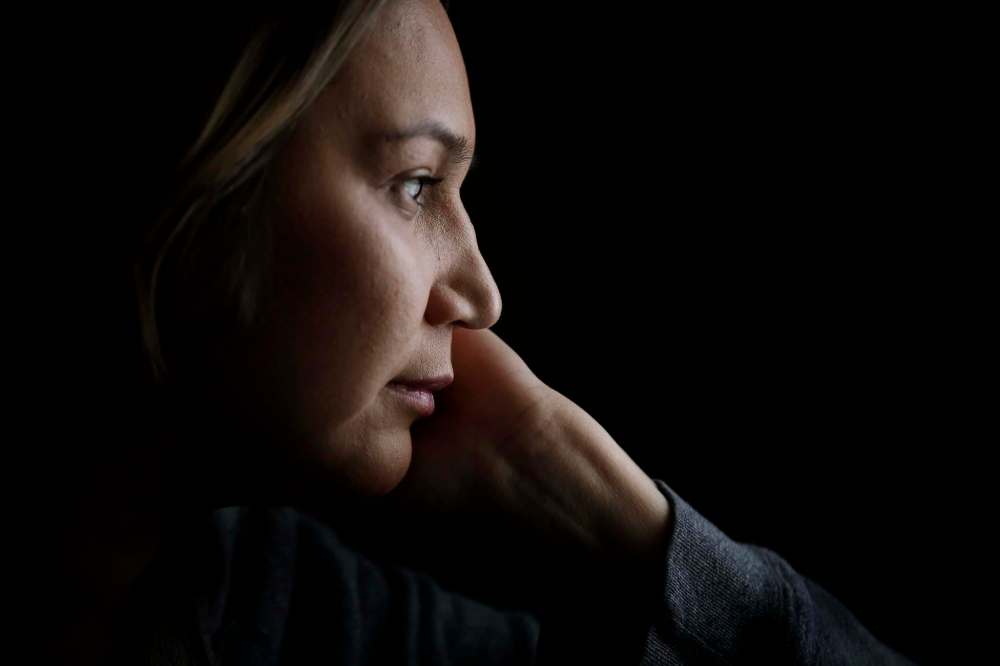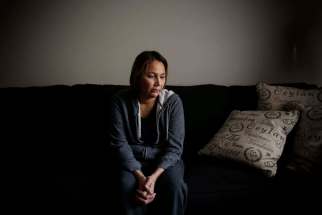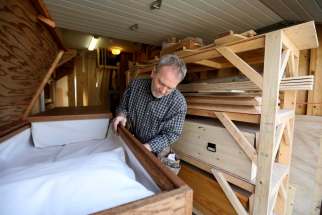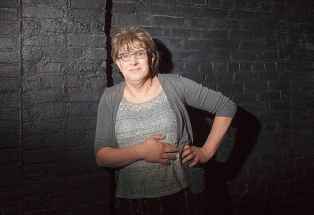Surviving, healing in the aftermath of violence
Read this article for free:
or
Already have an account? Log in here »
To continue reading, please subscribe:
Monthly Digital Subscription
$0 for the first 4 weeks*
- Enjoy unlimited reading on winnipegfreepress.com
- Read the E-Edition, our digital replica newspaper
- Access News Break, our award-winning app
- Play interactive puzzles
*No charge for 4 weeks then price increases to the regular rate of $19.00 plus GST every four weeks. Offer available to new and qualified returning subscribers only. Cancel any time.
Monthly Digital Subscription
$4.75/week*
- Enjoy unlimited reading on winnipegfreepress.com
- Read the E-Edition, our digital replica newspaper
- Access News Break, our award-winning app
- Play interactive puzzles
*Billed as $19 plus GST every four weeks. Cancel any time.
To continue reading, please subscribe:
Add Free Press access to your Brandon Sun subscription for only an additional
$1 for the first 4 weeks*
*Your next subscription payment will increase by $1.00 and you will be charged $16.99 plus GST for four weeks. After four weeks, your payment will increase to $23.99 plus GST every four weeks.
Read unlimited articles for free today:
or
Already have an account? Log in here »
Hey there, time traveller!
This article was published 25/04/2019 (2420 days ago), so information in it may no longer be current.
It’s not that Melody Sinclair wanted to die, she didn’t. As the ambulance screamed towards Winnipeg’s Health Sciences Centre, she tried to breathe, tried to hang on, and prayed to God she would make it: Jesus, please save me, she thought. Please don’t let me go.
There was no escaping the pain that arced through her body, radiating from the two deep stab wounds in her back. As paramedics and hospital staff worked to save her — “Stay with us,” she remembers them telling her — she felt herself letting go: of the pain, of the fear, of her own life.
Then, it was over, and she felt herself drifting away. Everything went white.
“There was no more pain,” Sinclair says, curled up on a couch in her sister’s home. “It was just accepting death.”
It is a crisp afternoon in mid-April. It’s been three months since Sinclair was stabbed, and more than six weeks since she was released from hospital.
She is still healing, in body as well as mind, and the scars carved into her back will always remind of what happened that night in late January.
She does not want to talk about the attack, or the person charged; it’s complicated, and at any rate, she has chosen forgiveness. It’s a conscious decision, one she made for her own well-being.
“I don’t want to hang onto that hurt anymore,” she says. “I just feel like carrying unforgiveness really weighs a person down.”

But she does have a story to tell. Because much is reported in the news about how people are injured; far less about how they survive. Headlines announce stabbings, shootings, assaults; what they rarely describe is how, for surviving victims, the journey is only beginning. In some cases, it is one that will never truly end.
For Sinclair, the journey has carried her through blood transfusions, dialysis, two major surgeries, and losing one-third of a lung. It carried her first through the uncertainty of surviving the attack, and then into the uncertainty of how to start living again: while she was recovering at home, she was told she’d lost her job.
Yet, she is still here. Hers is also a story of tenacity, of family, and of the faith she believes helped her get through. It is a story of friends rallying to help her get back on her feet, and one she hopes can help others understand what it takes to survive the unimaginable.
Because Sinclair did die in the hospital, at the moment she recalls letting go. Seven minutes, is what staff told her — that’s how long she was gone before they revived her. For the next four weeks, she drifted through a medically-induced sleep, periodically waking up just enough to thrash at the ventilator jammed in her mouth.
The dreams that came to her in sleep were strange, a jumble of things imagined and real. She dreamed the ICU was a school, and complained in the dream about how loud the students were. She dreamed she was writing a letter to the nurses, thanking them for taking care of her, but she thinks now the dream-nurses weren’t real.
Through the blur of that sleep, she began to understand she’d survived.
“I just felt like God saved me,” she said. “I thought I was done for, when it happened. But God didn’t let me go yet. I felt grateful that I wasn’t gone yet. I just knew I had to get better. Even in my dream I was telling my mom, ‘I’m going to go back to work in two days. One more day here, then I’m going back to work.'”

Recovery would take much longer. Sinclair’s body was struggling from the damage; the first surgery removed part of her lung. A second excised part of her colon, which was dying from lack of oxygen. Her toes turned black and, for awhile, medical staff thought she would lose them; they managed to hang on.
Then, there was the thirst. It was incredible, all-consuming; for weeks, she could eat and drink nothing, for fear of aspirating it into her lungs. She was fed through a tube, but that didn’t quench the thirst; as she got stronger, she began to sneak furtive handfuls of water from the bathroom sink, which at first sent her coughing.
“It was the hardest thing I think I ever had to go through,” she says. “My mouth was dry. My lips were cracking. My tongue felt like the desert… (When they finally let me drink), that morning, I had tears in my eyes.”
She was never alone. Her home community of Berens River First Nation supported her family with hotel costs; her mother stayed at her side, reading the Bible to her as she slept. Friends came to visit almost every day, and by the time Sinclair was released, the area around her bed “looked like a floral shop,” she says with a laugh.
It’s the kind of support many people never get to see, because it only happens after they’re gone.
“It showed me that a lot of people cared for me, and just really made me feel special,” she says. “It was encouraging.”
“I just knew I had to get better. Even in my dream I was telling my mom, ‘I’m going to go back to work in two days. One more day here, then I’m going back to work.'”
Bit by bit, Sinclair got stronger. Some of the nurses, she says, took to calling her “Miracle Girl.” By the middle of March, she passed her swallowing test, and was finally able to eat a little. She remembers her first meal: it was Corn Flakes, she says with a laugh, and it was amazing. Four days later, they let her go home.
The road to healing isn’t over. Even now, Sinclair struggles to keep food down, and is limited mostly to soup; she’s lost 18 kilograms since the day she was attacked. But she exercises every day, carefully trying to rebuild the strength that was drained from her body; she’s started playing guitar again, which helps with her lingering anxiety.
Often, her thoughts turn to the future. One day, when she is healed, she hopes to donate blood, to give back the life that was given to her (in the hospital, she learned she is a universal donor, type O negative). With her old job now gone, she has been thinking about going back to university, maybe to become a teacher.
“I just feel like my life is a whole new chapter,” she says. “Everything that’s old is gone… When God starts something new, everything’s new. This is a chance to restart everything.”
Some days, when the road to recovery still feels too long, she opens her Bible and turns to Psalm 103, the verse she stood on for her healing, and finds strength in the faith she reached for, when everything was slipping away. “Who redeemeth thy life from destruction; who crowneth thee with lovingkindness and tender mercies…”
“It’s brought me to a place with God where I know how much I’m loved,” she says of her journey. “And I feel really like, my life is in his hands. I’ll sometimes just cry, I’ll be so in awe of his goodness to me. And I just pray, and I thank him, and it makes me want to let others knows how much love he does have for us.”
Now, all those who love her are helping her get back on her feet. On Saturday, Sinclair’s friends are rallying for a fundraiser social at Boogie’s Diner (1155 Main St.); tickets are $25, and it runs from 5:30 p.m. to 9 p.m. People can also donate on a GoFundMe fage.
melissa.martin@freepress.mb.ca
Our newsroom depends on a growing audience of readers to power our journalism. If you are not a paid reader, please consider becoming a subscriber.
Our newsroom depends on its audience of readers to power our journalism. Thank you for your support.
History
Updated on Thursday, April 25, 2019 9:04 PM CDT: Fixes typos











